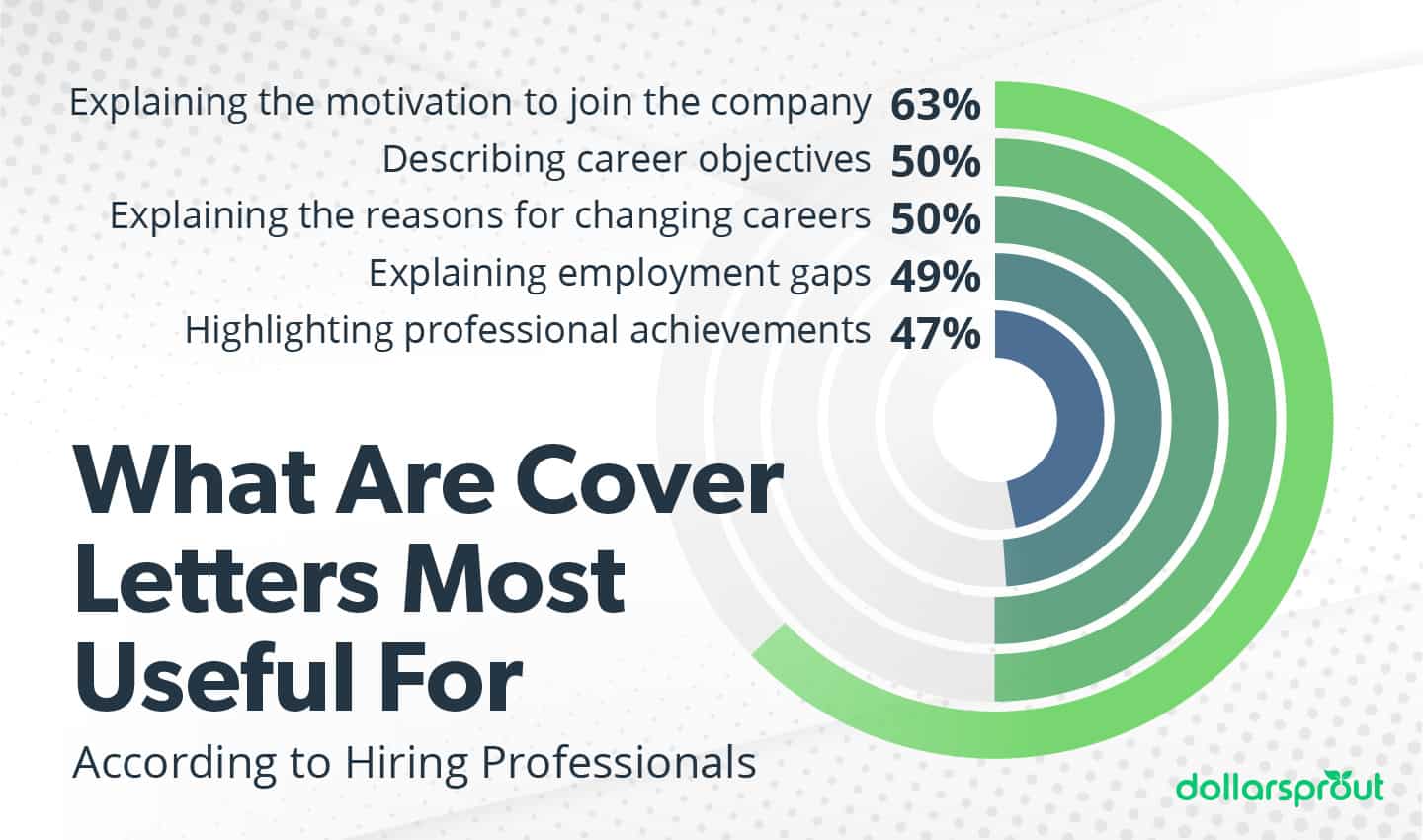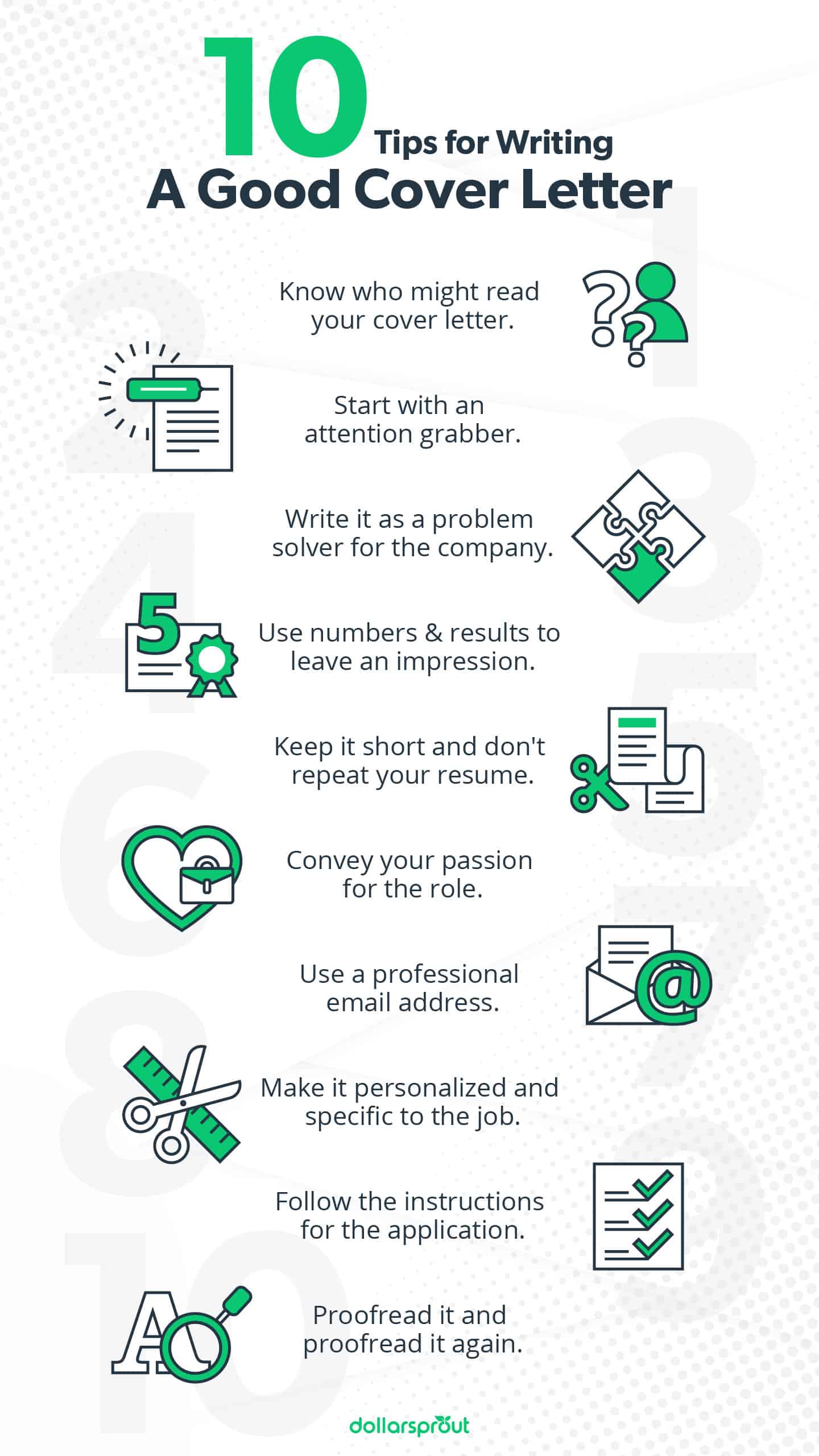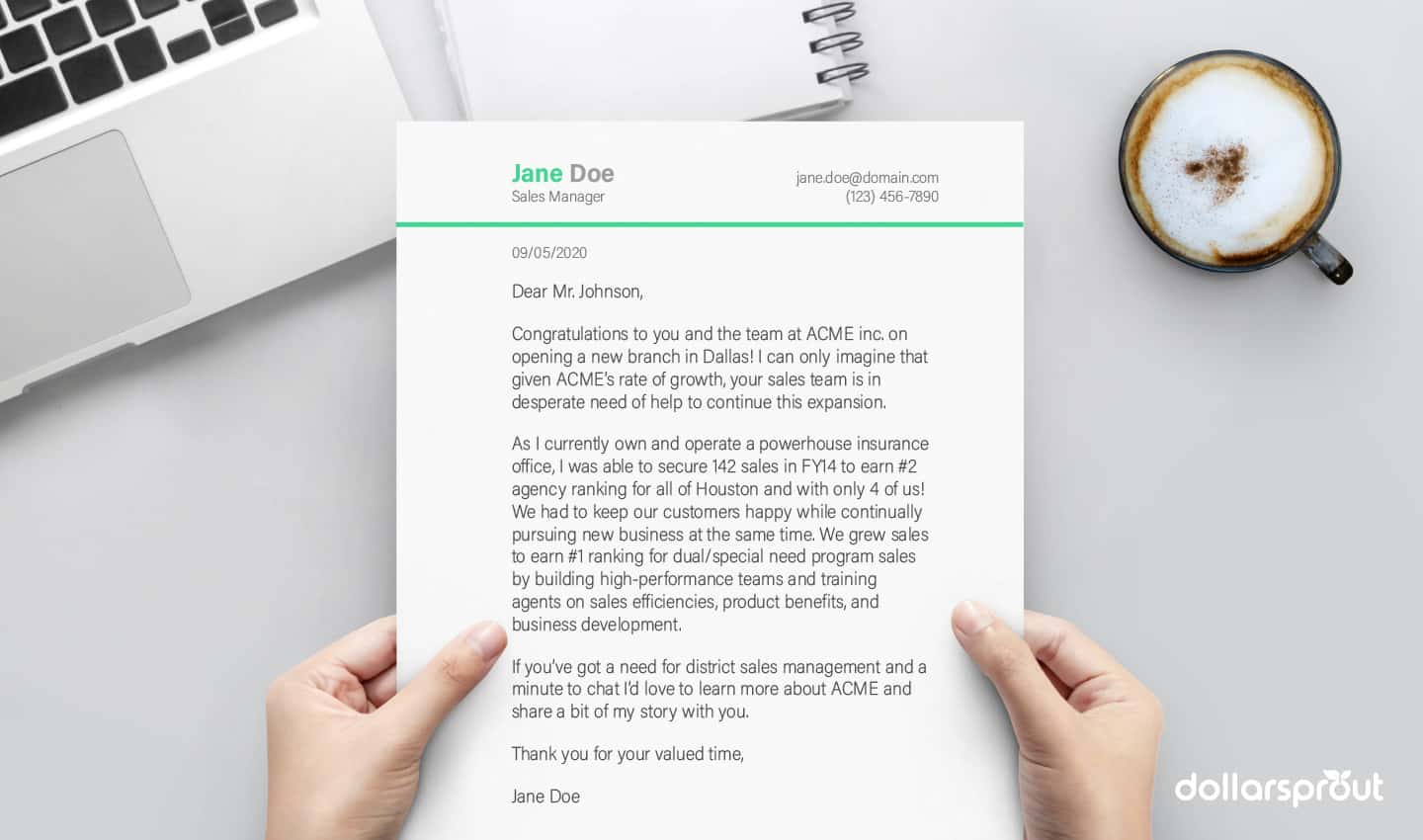How to Write a Cover Letter That Gets Noticed (with Example)
Our readers always come first
The content on DollarSprout includes links to our advertising partners. When you read our content and click on one of our partners’ links, and then decide to complete an offer — whether it’s downloading an app, opening an account, or some other action — we may earn a commission from that advertiser, at no extra cost to you.
Our ultimate goal is to educate and inform, not lure you into signing up for certain offers. Compensation from our partners may impact what products we cover and where they appear on the site, but does not have any impact on the objectivity of our reviews or advice.
A well-crafted cover letter can leave a first impression that gets you noticed well before an employer ever gets to your resume. Here's how to make the most of that important moment.

Our mission at DollarSprout is to help readers improve their financial lives, and we regularly partner with companies that share that same vision. If a purchase or signup is made through one of our Partners’ links, we may receive compensation for the referral. Learn more here.
Early in my career, cover letters and resumes involved a trip to the printer and at least one sleepless night of obsessing over punctuation. Only recently, when I attempted to hire someone myself, did I realize how much things have changed — or how much people seem to think things have changed.
Many emailed resumes came with a short note, if anything. More than one used smiley face emojis. And while they’re great for texting, using emojis in a cover letter comes across as unprofessional.
Cover letters may be more often emailed rather than printed these days, but you still need to follow basic cover letter etiquette. Without it, you might find yourself struggling to get the job you want.
What Is a Cover Letter and Is It Still Relevant?
“Should I include a cover letter in my application’ is the number question I get asked,” said career strategist Jasmine Escalera. “And my response back is filled with the facts. Almost half of applicants get rejected for not including this critical document.”
A cover letter is a sales pitch for an internship or a job. It sells you to the company you want to hire you. Your resume provides proof of your claims.
When writing your cover letter, you want to sell your excitement about working for the company and make them excited to meet you.
Related: How to Make a Resume from Start to Finish 📝
10 Tips for Writing a Cover Letter That Employers Will Read
If you’re new to writing cover letters or need to brush up on your skills, here are ten tips from hiring managers, recruiters, and career coaches so you can get it right and land your dream job.
1. Know who (or what) might be reading your cover letter.
In the same way Google crawls the internet looking for keywords when you search for them, Applicant Tracking System Software, or ATS, looks for keywords in your resume or cover letter that match the job description.
By using the same keywords the company uses, you improve your chances of your application passing on to a human reader.
That’s why Al Smith, aka “The Hired Guy,” suggests knowing your job title and paying attention to the keywords for that title, and making sure they appear throughout your resume and cover letter at least three times each.
2. Start with an attention grabber.
Be unique and avoid boring the reader. Try to be more creative than starting with “I am writing this cover letter to…”
“Get personal. Your cover letter can be slightly more casual than your resume,” said Chelsey Opare-Addo of Not Your Mother’s Resume. “This is your chance to use personal pronouns, tell your story, and explain your passion.”
Keep it simple and get to the message quickly; taking too long to get to the point might make them skip over the rest of your application. Some options Chelsey suggests include starting with a compliment to the company, a statement of why you admire their mission, or recognition of their thought leadership in the industry.
“The reader should know why you’re interested in working for that company,” she added.
3. Write it as a problem solver for the company.
Read up on the company, or glean it from the job description, to see what kinds of challenges they’re facing. Then, use that information to customize your message in the cover letter.
“Make sure to mention the company’s name, the challenges it’s currently facing, and how your unique blend of skills will help address them to make your introduction more personalized and attention-grabbing,” suggested Max Woolf of ResumeLab.
For example, if the company just started a new social media account on a particular platform, you can talk about your experience growing audiences with that platform.
Related: How to Stand Out at Work (in the Best Way Possible)
4. Use numbers, samples, and results to leave an impression.
Anyone can use adjectives to describe themselves. Instead, rely on facts. And rather than stating you’re a devoted or eager employee, show that you are.
“When explaining yourself in the cover letter, use samples and several performance results,” said Noa Aziz, CEO of Zentern.
Instead of saying you’re a great salesperson, Noa advises, use an example such as:
“In my previous job at [Company], I was promoted within three months to project manager as a result of increasing sales by 20% and creating over 10 new partnerships.”
If you’re struggling with this part of your cover letter, ask a trusted coworker or friend to describe you or your accomplishments in your position.
5. Keep it short and don’t repeat your resume.
“The biggest mistake most candidates make is to make an excessively long cover letter,” said Yaniv Masjedi, CMO at Nextiva.
You want to respect the hiring manager’s time by keeping your letter succinct and enjoyable.
Describe the things that aren’t shown on the resume, such as challenges you faced, decisions you’ve made, or the results of your work.
As Branka Vuleta, founder of legaljobsite.net puts it, “The cover letter should be short and exciting. It should show your enthusiasm and sincere appreciation of the company’s work. Writing a cover letter of up to 300 words is perfectly fine.”
If you’re struggling with keeping your cover letter short, have a friend look at, or consider hiring an editor who specializes in resumes and cover letters. You might even be able to use a service like Find My Profession.

6. Convey your passion for the role.
Employers want someone who really wants the job.
“Make your cover letter stand out by showcasing your passion for the role with a personal story,” advises Samuel Johns from Resume Genius.
He says, for example, that someone applying to become a make-up artist might start their cover letter with a story such as:
“Ever since I was a child, I’ve loved transforming my friends and family through the art of make-up. My proudest achievement was doing the make-up for my sister on her prom night — she was selected as prom queen that evening.”
It doesn’t have to be a story conveying a major accomplishment, but it should be one that demonstrates your proficiency and passion for the job.
Related: 11 Skills Employers Looks for That Most People Never Think About
7. Use a professional email address.
Present yourself as professionally as possible. That includes using a good, professional email address.
“Not ‘CrazyCatLady@xyz.com,’” said Deb Geller, author of Building Talent Pools: A Professional Development Model for Succession Planning, “and don’t use fancy paper or fonts.”
It may seem boring, but your resume needs to be easily copied and scanned, and you want to make that as easy on the hiring manager as possible.
8. Make it specific to the job.
It’s tempting to write one cover letter and submit it with multiple applications, but the effort to personalize it will pay off.
Find the company’s mission, vision, and values, and look for ways to work those into your cover letter.
Jana Tulloch, Founder of Tulloch Consulting, said that her company looks for the effort potential candidates put into their cover letter. They look to see if it’s tailored to the job, uses keywords from the posting, and if it highlights how they match the requirements.
“It’s important for candidates to research not only the role they are applying for, but the company as well, and to speak to how their individual values and achievements align with the company’s values and goals,” Tulloch advises.
Since your cover letter should answer the question, “Why should we pick you?” it needs to show that you are the best candidate for the position. This is hard to do if you use a canned or recycled cover letter.
Related: 10 Resume Mistakes to Avoid (and What to Do Instead)
9. Follow the instructions.
This is your first test: did you follow the instructions for the application?
“Read them carefully,” said Jon Hill, CEO and Chairman of recruiting company The Energists. “This may sound glib, but, especially when you’re applying to a lot of different jobs, it can be easy to start glossing over the details in the applicant guidelines because they’re often quite similar.”
For each job, create a checklist from the paragraphs of information they give you, and check off each item as you include it. Remember to pay attention to the details they request and the format in which they request them.
For instance, if they want you to provide your cover letter as a Word document, make sure you submit it as a Word document rather Pages or a Google document.
10. Proofread it, and proofread it again.
Typos give the wrong impression. And thanks to spell check, grammar-checking software like Grammarly, and your grammar-savvy friends, you can create a typo-free cover letter.
“If your letter is full of mistakes, you’re speaking volumes about your attention to detail,” said Timothy G. Wiedman, D.B.A., a retired Associate Professor of Management & Human Resources. He remembered that he once received a cover letter from an applicant who mentioned they graduated from a top tier “collage.”
“I was not impressed,” he said.
To avoid gaffes like that, Wiedman advises having someone with solid writing skills proofread your cover letter. You can also have your cover letter read out loud by software.
You might also consider learning the mail merge function in Word, which will help ensure the email address you’re using matches the correct manager’s names.
Using all available resources will ensure you submit an error-free cover letter.
Related: How to Write a Resignation Letter that Leaves a Good Impression
Sample Cover Letter Format
Matthew Warzel, President of MJW Careers, provided a template cover letter. You can use this exactly or as inspiration to create your own.
[DATE]
RE: [TITLE] Position
Salutation:
Dear [NAME OF HIRING MANAGER],
Opening Paragraph
Congratulations to you and the team at [NAME OF COMPANY] on [RECENT SUCCESS]. I can only imagine that given [NAME OF COMPANY]’s rate of growth, your sales team is in need of help to continue this expansion.
Body Paragraph
As I currently own and operate a powerhouse insurance office, I was able to secure142 sales in FY14 to earn #2 agency ranking for all of Houston and with only 4 of us. We had to keep our customers happy while continually pursuing new business at the same time. We grew sales to earn #1 ranking for dual/special need program sales by building high-performance teams and training agents on sales efficiencies, product benefits, and business development.
If you have a need for district sales management and a minute to chat, I’d love to learn more about [NAME OF COMPANY] and share a bit of my story with you.
Thank you for your valued time,
[YOUR NAME]Writing a Good Cover Letter Can Set You Apart
Writing a good cover letter takes time. Each one is an investment, so you have to be smart about it. It’s better to take your time and apply to fewer jobs with a quality cover letter than blast your resume with a generic note to as many jobs as you can find.
Every job application is a bet placed that you have what it takes to get the job. Show that you’re the best candidate by writing a stellar cover letter.
Related: Not Sure What to Bring to a Job Interview? Don’t Forget These 10 Things











